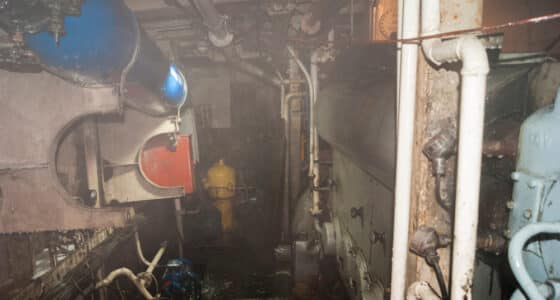William Losurdo died of mesothelioma just 17 months after being diagnosed with the rare asbestos-related form of cancer. His family filed suit against the companies they blamed for exposing him to the carcinogenic material, and by the time they got to trial, only General Electric and Westinghouse remained. Though the two conglomerates petitioned for the case against them to be dismissed, the judge hearing the case largely denied their request.

Navy Veteran Suffered Significant Exposure to Asbestos
Before his mesothelioma death, Mr. Losurdo provided detailed deposition testimony about his asbestos exposure. He recounted enlisting in the Naval Reserve in 1967 and serving on active duty from February 1969 to November 1970. He was assigned to the USS Mississinewa, an oil tanker that refueled warships at sea. Although his initial duties were limited to chipping paint and swabbing the deck, he was later promoted to a position with responsibility for processing requisitions from various departments throughout the ship.
When the Mississinewa experienced mechanical problems in March 1970, it was hauled to Boston Naval Shipyard for repairs, and Mr. Losurdo spent the remaining eight months of his active duty service on the ship while it was in dry dock. During that time, he entered the engine room of the ship three to four times per week, spending anywhere from thirty to sixty minutes each time equipment was drilled and cut. He recalled observing “particles flying around.” Additionally, his office was only four feet from the entrance to the engine room. He said, “When you opened up the compartment door to go down into the boiler room, … dust was flying because they were probably sawing, you know, or they were sawing equipment apart, the bad equipment.”
Mesothelioma Victim’s Navy Ship Contained Asbestos-Contaminated Parts
Though Mr. Losurdo did not recall the specific equipment that was being worked on, his family provided evidence that the ship was equipped with two main propulsion turbines manufactured by GE and three ship service turbine generators manufactured by Westinghouse. They blamed this equipment for his exposure.
Both companies argued that they did not owe Mr. Losurdo a duty to warn based on a previous Supreme Court ruling. They also asserted that the victim’s family had failed to establish a genuine dispute of material fact as to whether their products were the cause of his illness and death, that they were immune from prosecution under the government contractor defense, and that the family was not entitled to claim either punitive damages or loss of consortium.
The court granted the asbestos companies’ request to dismiss the loss of consortium and punitive damage claims based on their unavailability in maritime wrongful death claims, but it denied their other pleas, noting the triable issues of fact in the case. The family will be able to continue their pursuit of justice.
